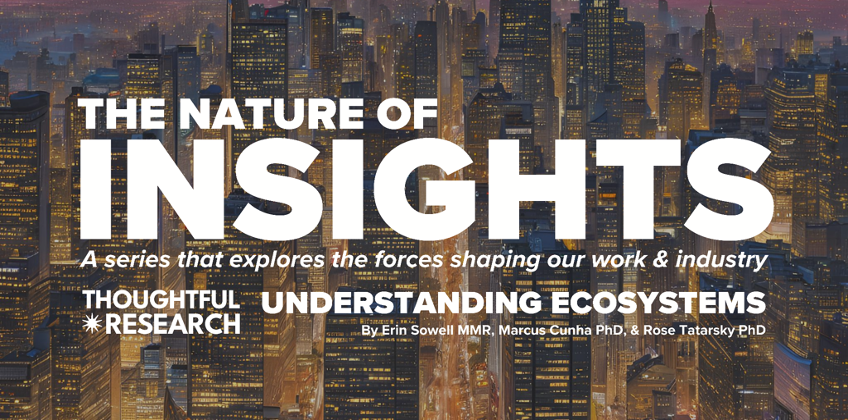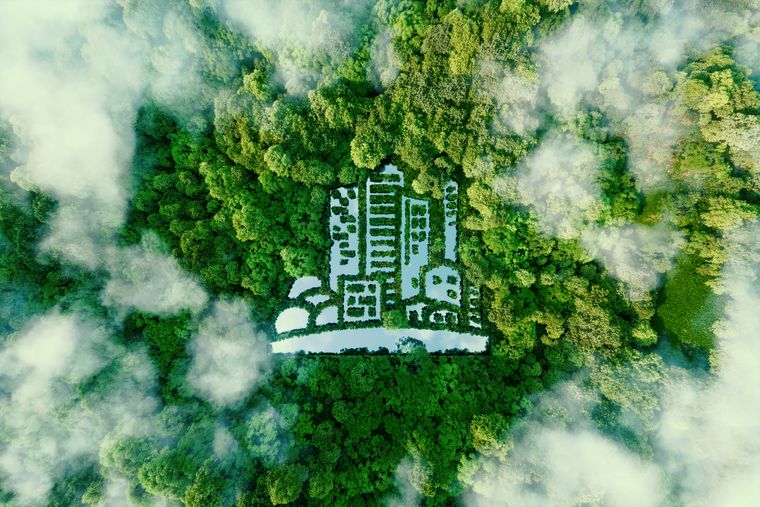The Nature of Insights: Understanding Ecosystems
Uncover the hidden forces shaping today’s business landscape. Adopting an Ecosystem Lens gives you a deeper understanding of the elements, interactions, and dynamics that drive success across organizations, industries, and markets.

Article series
The Nature of Insights
- The Nature of Insights: Series Introduction
- The Nature of Insights: Understanding Ecosystems
- The Nature of Insights: Optimizing Strategies
Success today is about more than direct competition—it’s about navigating change.
In the first article of this series, we explored how the nature of success in business is changing alongside the Insights Industry. As technology advances and consumer behavior shifts, success is no longer just about outperforming competitors. It requires strategic navigation of an increasingly complex business landscape where leaders must continuously learn from their environment, adapt to changing conditions, and engineer solutions that transform their surroundings. In this dynamic landscape, insights are a compass—guiding leaders and brands toward success.
If insights are the compass, insights professionals are the expert navigators—helping leaders and brands chart their course. No longer just providers of information, insights professionals have become strategic partners and corporate leaders. By recognizing patterns and uncovering opportunities, we equip businesses with the understanding to make informed decisions and move forward with confidence.
This shift toward strategic navigation aligns with the principles of ecosystem science.
Ecosystem science explores how individuals and groups interact and adapt within complex systems. Business often borrows the term “ecosystem” to describe collections of companies, technologies, or products—but this definition misses the bigger picture. True ecosystems are dynamic and interdependent networks where players compete for resources and collaborate to create value to survive an ever-changing landscape. If this sounds familiar, it’s because the business world operates under the same principles. Organizations, industries, and markets aren’t just like ecosystems—they are ecosystems, and success within them depends on a decision-maker’s ability to understand the broader system and navigate its forces effectively.
Insights professionals are not only expert navigators; we are also business ecologists—analyzing business ecosystems. Natural ecologists study how species interact, energy flows, and natural landscapes shift over time. Insights professionals examine how players interact, value flows, and business landscapes shift over time. Both fields aim to understand complex systems and apply that knowledge to foster competition, collaboration, and adaptation. Our insights empower individuals and groups to create effective strategies and take action.
Thoughtful Research enables insights professionals to apply ecosystem science through The TRANSFORM: Framework™.
The TRANSFORM: Framework™ is a structured approach for navigating business landscapes through strategic decision-making. It leverages ecosystem science and established insights practices to help leaders and brands make informed decisions.
The framework follows three essential steps:
Learn: Understand your ecosystem’s elements, interactions, and dynamics.
Adapt: Optimize strategies to align with changing conditions.
Engineer: Secure lasting success by proactively transforming your environment.
This process moves leaders and brands beyond static, competition-driven strategies toward a more dynamic, systems-based approach.
The goal of the Learn step is to collect information and uncover the nature of success in your ecosystem.
Focusing on individuals—customers, competitors, and other key stakeholders—provides useful insights, but it only tells part of the story. Success comes from seeing the bigger picture and recognizing that your organization, industry, and market are interconnected ecosystems shaped by their elements, interactions, and dynamics.
By adopting an ecosystem lens, leaders and brands can learn about their business landscape in a systematic way. This helps them move beyond reactive strategies to anticipate shifts and uncover hidden opportunities. The rest of this article provides an overview of the key components of an ecosystem—its elements, interactions, and dynamics.
All ecosystems—natural or business—are made up of three foundational elements: conditions, players, & resources.
Conditions serve as the backdrop, shaping how ecosystems function and evolve. There are two types of conditions: Climate encompasses intangible forces such as economic, political, and cultural factors, much like temperature, precipitation, and seasonal patterns influence natural ecosystems. Terrain consists of tangible elements like geography, infrastructure, and technology that define where a business operates, just as mountains, rivers, and soil composition determine where and how species exist and interact in nature.
The players within an ecosystem bring it to life, creating the interactions and driving dynamics. In nature, these players include plants, animals, and fungi; in business, they consist of customers, competitors, employees, and many more. Each player influences and responds to others, forming connections that drive competition and collaboration. Some players have a significant impact on the system, while others take on smaller yet essential roles.
Resources such as sunlight, water, and nutrients in nature determine how species survive and thrive, just as financial, human, social, and intellectual capital shape a player’s ability to create value and grow. Their availability influences relationships among players, affecting stability, opportunities, and the overall trajectory of the ecosystem.
Looking deeper into an ecosystem reveals interactions and dynamics, helping leaders navigate change and uncover new opportunities.
Interactions within an ecosystem create value, strengthen connections, and drive growth through communications, transactions, and relationships. Communications can be promotional or informational, capturing attention, aligning stakeholders, and sharing knowledge. Transactions keep value in motion through the exchange of goods and services. Relationships are long-term interactions and value exchanges, sometimes mutually beneficial and other times favoring one party at another’s expense.
Ecosystem dynamics are driven by competition, transformation, and evolution. Competition fuels innovation and differentiation as players strive for resources and opportunities. Transformation occurs when players make fundamental changes to their ecosystem’s structure, function, or composition. Evolution is the continuous process of change over time, where organizations, industries, and markets adjust through variation, knowledge exchange, and external disruptions.
The interplay of elements, interactions, and dynamics creates a constantly evolving ecosystem that demands learning, adaptation, and engineering for survival and growth.
Success today isn’t about resisting change—it’s about embracing it. Businesses don’t operate in isolation; they exist within complex ecosystems where competition and collaboration create dynamic feedback loops. These forces shape economies, accelerate technology, and influence cultural trends, determining how resources flow and defining what it means to succeed. Change isn’t just inevitable; it’s the engine of progress. Competition sparks innovation, transformation drives evolution, and adaptation ensures longevity. Succeeding in an ever-changing landscape demands more than direct competition—it requires an ecosystem approach that prioritizes strategic navigation.
Succeeding in a changing environment requires understanding the broader system—how players interact, how value moves, and how the landscape evolves. Leaders and brands who embrace an ecosystem mindset don’t just react to change; they learn from it, adapt to it, and engineer solutions for lasting success. By transforming themselves and their surroundings, they create value not just for their own growth but for their broader community. Now, expand your view beyond individual elements to see the full ecosystem. Look at your organization, industry, and market through an ecosystem lens so you can make sense of complexity and navigate strategically.
Join us for the next installment of The Nature of Insights: Optimizing Strategies.
In the next article, we’ll explore the Adapt: Optimize Your Strategy step, examining how leaders and brands can strategically adapt to stay relevant and responsive in the face of ongoing change. Together, we’ll continue building the tools to navigate complexity and create lasting impact.
Want to learn more? Watch our TEDx Talk, where we dive into the principles of ecosystem science and introduce The TRANSFORM: Framework™.
Erin Sowell MMR
Researcher, Consultant, & Founder at Thoughtful ResearchErin Sowell is a researcher and consultant who applies ecosystem science to business and marketing. She is the founder of Thoughtful Research, an insights consultancy that helps leaders, brands, and organizations navigate rapidly changing markets and business environments. Prior to Thoughtful Research, Erin was an Associate Manager of Innovation Insights at Georgia Pacific and Research Manager at Kroger's Retail Data Science, Insights, & Media Company, 84.51°. Before entering the Insights Industry, Erin represented the World Corrosion Organization at the United Nations. Erin received her Master of Marketing Research from the Terry College of Business at the University of Georgia and her B.S. in Earth and Environmental Science from Lehigh University.
Marcus Cunha Jr. PhD
Partner at Thoughtful Research, Marketing Professor at University of GeorgiaMarcus Cunha Jr. is the Robert O Arnold Professor of Marketing at the University of Georgia (UGA) and the Director of the UGA’s Master of Marketing Research (MMR) program. His research focuses on cognition, judgment, and decision-making as applied to understanding issues in pricing and branding. Dr. Cunha’s research has been published in premier research journals such as the Journal of Consumer Research, Journal of Marketing Research, Marketing Science, and Journal of Marketing. He teaches MBA, MMR, and PhD students at UGA. He was awarded the college wide Outstanding Faculty Award for Teaching Excellence and the Hugh O. Nourse outstanding MBA teacher award by the Terry College of Business. Dr. Cunha also teaches the topics of statistical analysis, consumer behavior, behavioral economics, and media effectiveness research to large corporations such as Chick-fil-A, Lowe's, and Assurant, the Georgia Banking Association, and the Advanced School of Marketing Research (American Marketing Association). He has conducted consulting projects for multinational corporations both in the USA and in Brazil and has trained research executives in both countries.
Rose Tatarsky PhD
Science Communications Consultant at Thoughtful ResearchRose Tatarsky, PhD, is a research scientist specialized in neurobiology and animal behavior. Her work focuses on the neural and genetic mechanisms driving natural behaviors within the context of an animal's environment and evolutionary history. She earned her doctorate from Cornell University in 2022 and currently holds a postdoctoral research position at the Paris-Saclay Institute of Neuroscience. In 2023, Rose joined Thoughtful Research as a Science Communications Consultant, inspired by engaging conversations with Erin about the strategic use of ecosystem science in business & marketing contexts.
Article series
The Nature of Insights
- The Nature of Insights: Series Introduction
- The Nature of Insights: Understanding Ecosystems
- The Nature of Insights: Optimizing Strategies


